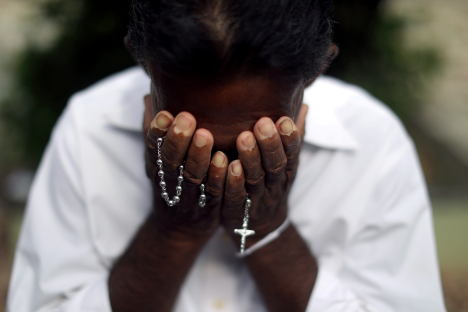August 2 | ![]() 0 COMMENTS
0 COMMENTS ![]() print
print

The great unanswered question of good and evil
Fr Michael Kane argues that while the problem of evil might remain unresolved, grace is still present in the darkest experiences.
I recently watched a heated debate between a committed lay Christian and an avowed atheist. Naturally, both sought to argue the validity of their beliefs. After a long time sparring over theology and science, the atheist landed his killer blow: “If God is so good then why is there so much evil in the world?”
The Christian instinctively responded with a question of his own: “Surely the existence of so much good in the world points precisely towards God, the source of all that is good?”
Disappointing answer
It was a disappointing answer; a missed opportunity to explore an inescapable question for all believers. Of course it is correct that the presence of so much good originates in the Divine; all that is good comes from God.
But evil surrounds us too, and we cannot take flight from this perennial and essential question. In a world governed by the justice of God, why are there such inexplicable injustices? Why do bad things happen to good people and, conversely, why do good things come the way of people who commit heinous evil?
Difficult solution
The problem of evil is certainly not one that we can solve easily. No Christian can fully claim to understand or explain away these injustices which dominate every level of the created order.
Of course, we know that evil exists as the fruit of Original Sin. The disobedience of Adam gives life to disorder in the form of natural and moral evil. In light of that first Fall, humanity is now subject to a fallen order which was not part of God’s original plan. We now live in a broken world, with grace and sin, good and bad, life and death all part of the new landscape.
Unjust distribution
As Christians, this explains to us why there is evil but it does not account for its sporadic and unjust distribution. This is a painful but indisputable truth. Try as we may, we can never rationalise the presence of evil in the life of one who is good and virtuous.
We can never, for example, explain away the death of a baby about to be welcomed with intense love into the hands of his adoring parents. We cannot explain the agony which a husband or wife endures on watching their spouse struggle through a cruel and painful end. We cannot rationalise the countless baffling natural disasters and horrors which every day afflict innocent and good people, believer and unbeliever alike. These are the innocent casualties of our fallen world.
Susceptible to suffering
Certainly, our Christian Faith is no guarantee that we will be insulated from these trials and crosses. It is a naive Christian who believes that Faith is our ticket to an easy and gentle path through life. We are all susceptible to the cross of suffering.
Faith does, however, grant us one vital gift which we call grace. Grace is a gift from God to sustain and fortify us to endure all these things.
This is the distinctive mark of a Christian; we live by grace. In those moments when we are labouring under the weight of suffering, God’s grace lifts us up. St Paul explains this transformative work of God when he writes: “When I am weak then I am strong.”
Living in God’s grace
Paul’s words are not a mere cliché. They speak of a reality which is eminently perceptible. In my life as a priest I have seen, on countless occasions, the work of God’s transforming grace in the lives of the sick, the dying, the bereaved, and countless others who live each day under the heavy weight of the cross.
Every day I see good people, faithful and virtuous people, encounter inexplicable and unmerited evil in the form of sickness and pain, yet who live immersed in God’s grace.
I see lives turned upside-down in an instant, but which remain anchored on supernatural gifts. I see people filled with trust even when the darkness of suffering descends upon them. This grace bears beautiful fruits in the lives of believers: it gives hope, renews Faith, instils contentment and peace, takes away bitterness, and even generates unexpected moments of joy and thanksgiving.
A Christian duty
Therefore, as Christians, we must accept that the greatest quandary of all is the problem of unmerited suffering, and the age-old problem of evil. It requires humility on our part to accept that this is the great unanswered question of our Faith.
It is not our duty to explain to others why God permits evil to exist in such random circumstances.
Our duty is to radiate the power of God who raises us up when we find ourselves burdened by suffering. This response will show God’s presence and His fingerprint in our world. It is His grace which raises the weak to make them strong.
All of this poses a new, unsettling question for the atheist. How does he account for a suffering Christian who has been transformed and raised up by the power and grace of God? How does he account for the believer who takes up his cross with peace and hope in his heart?










